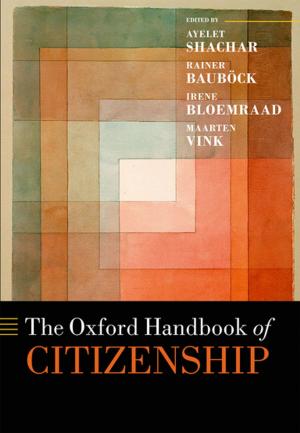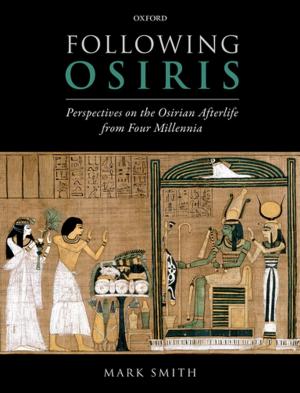The Production of Space in Latin Literature
Fiction & Literature, Literary Theory & Criticism, Nonfiction, Social & Cultural Studies, Social Science, History| Author: | ISBN: | 9780191080494 | |
| Publisher: | OUP Oxford | Publication: | March 16, 2018 |
| Imprint: | OUP Oxford | Language: | English |
| Author: | |
| ISBN: | 9780191080494 |
| Publisher: | OUP Oxford |
| Publication: | March 16, 2018 |
| Imprint: | OUP Oxford |
| Language: | English |
Recent decades have seen a marked shift in approaches to cultural analysis, with the critical role of location and spatial experience in the formation of the human subject gaining increasing prominence. Henri Lefebvre's La Production de l'Espace (1974), a seminal work in what is now called the 'spatial turn' in the humanities, stresses that space is to be included among the sites of hegemonic power and ideological contestation in a society: it is not simply a neutral setting within which human action takes place. This idea has obvious relevance to the study of ancient Rome, in which space was formative, yet also contested, and could be endowed with cultural meaning by the uses its citizens made of it and the ways in which they put it into play. This volume applies the insights and concerns of the 'spatial turn' to this specifically Roman engagement with space, and explores its representation and manipulation in Latin literature. The terrain covered by the contributions is broad, both temporally (from Catullus to St Augustine) and in terms of genre, with lyric, epic, elegy, satire, epistolography, and historiography all finding their place. Discussions focus mainly on movement and the mobile subject in the experience and making of space, rather than fixed monumental space within which a subject moves and acts. Offering a detailed exploration of Roman engagement with space, the ideological stakes of this engagement, and its intersections with empire, urbanism, identity, ethics, exile, and history, the volume contains a wealth of insights for readers across and beyond the discipline of classical studies: those looking equally for new approaches to ancient texts and authors or to explore the relationship between the materiality of antiquity and its literary aspects will find these discussions illuminating.
Recent decades have seen a marked shift in approaches to cultural analysis, with the critical role of location and spatial experience in the formation of the human subject gaining increasing prominence. Henri Lefebvre's La Production de l'Espace (1974), a seminal work in what is now called the 'spatial turn' in the humanities, stresses that space is to be included among the sites of hegemonic power and ideological contestation in a society: it is not simply a neutral setting within which human action takes place. This idea has obvious relevance to the study of ancient Rome, in which space was formative, yet also contested, and could be endowed with cultural meaning by the uses its citizens made of it and the ways in which they put it into play. This volume applies the insights and concerns of the 'spatial turn' to this specifically Roman engagement with space, and explores its representation and manipulation in Latin literature. The terrain covered by the contributions is broad, both temporally (from Catullus to St Augustine) and in terms of genre, with lyric, epic, elegy, satire, epistolography, and historiography all finding their place. Discussions focus mainly on movement and the mobile subject in the experience and making of space, rather than fixed monumental space within which a subject moves and acts. Offering a detailed exploration of Roman engagement with space, the ideological stakes of this engagement, and its intersections with empire, urbanism, identity, ethics, exile, and history, the volume contains a wealth of insights for readers across and beyond the discipline of classical studies: those looking equally for new approaches to ancient texts and authors or to explore the relationship between the materiality of antiquity and its literary aspects will find these discussions illuminating.















